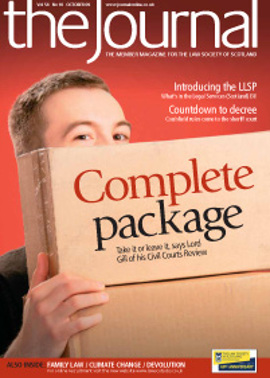The Gill Report? What's not to like?

A commercial litigator presented with a report which promises to make litigation quicker and more efficient and then holds out the prospect of more being attracted to the Scottish jurisdiction must inevitably be positive, indeed enthusiastic. To do otherwise would be similar to a young child asking that the sweetie shop be closed.
Some elements of Lord Gill’s Civil Courts Review, which was published on 30 September, are little more than the inevitable, such as insistence on the courts catching up generally with modern IT and communication systems.
Perhaps the most dramatic vignette, however, is Lord Gill’s reference to the Court of Session becoming a “playpen” for certain irresponsible party litigants. What an image that conjures up. On a serious note, though, it does recognise the need for the significant delay and disruption caused by a small number of these individuals to be removed from the system.
Inevitably, the devil will be in the detail. However for firms which have embraced the processes of the Commercial Court – in the Court of Session or in Glasgow Sheriff Court – it is particularly heartening to see that the type of case management approach adopted by those courts seems, at least at first sight, to have achieved a preference over those who lobbied in favour of more“case flow” management (such as is employed in personal injury cases and which, in our view, can lead toa “tick box” approach).
Acknowledgment of the part which delays in issuing judgments can play in litigators’ – and more importantly clients’ – frustrations with the system is an important part of the report. The long overdue removal of personal injury work of modest scale from the Court of Session, against substantial lobbying to the contrary, is especially welcome.
It is notable too that Lord Gill’s report does not appear to adopt slavishly everything done south of the border. For instance, it rejects too much emphasis on so-called “pre-action protocols”, partly on the basis of English experience of excessivecost consequences.
Likewise, any prospect of making mediation compulsory pre-litigation has not found favour. The notion of the courts as a last resort only has been rejected. While alternative dispute resolution (ADR) is a valuable – indeed essential – tool in the contentious lawyer’s armoury, encouragement, not compulsion, is the line taken. This more balanced approach from Lord Gill accords with our view of ADR’s proper place in the scheme of things.
So what challenges will the report face? One of the most obvious is the pressure – indeed in many courts, dominance – of criminal business. Although this was a report on civil justice, the degree to which court resources are dominated by criminal business has inevitably meant that it has had to trespass into that area.
The issues which arise from the volume of work in that field will not all be easily resolved.
Wider than that, however, is the general question of resources. Such a radical reorganisation of court and other structures will carry with it a significant cost implication, even if it is thought that, in the longer term, those costs will be more than justified by efficiencies elsewhere. That is particularly so when what those holding the purse strings will feel is that the highly cost-effective use of part time sheriffs and temporary judges is deprecated. This is not the best financial climate in which to be looking to spend money.
Are there any negatives? From a commercial litigator’s perspective there is perhaps a little too much emphasis on penalties and sanctions. Relatively recent history in the Court of Session tells us that undue emphasis on such a point in the courts’ mindset and approach will simply deter users from participating in that area of the court, if they have a choice. An emphasis on being, while firm, user-friendly and flexible will pay far greater dividends.
The report’s most radical proposal is the wholesale shift of civil business into the sheriff court. For many small and medium-sized enterprises, in particular, a claim of £100,000 is a very substantial one. They will want to be assured that they will receive a decision of the highest quality. To create the necessary business confidence in the new scheme, care will have to be taken to build on the best features of commercial courts at present.
This magnum opus – or major work in more modern language – will clearly repay close study.
In this issue
- The Combined Standard Clauses (2009 edition)
- Preserving a legal inheritance: settlement rights in the "Occupied Palestinian Territories"
- The European Court and the duty to investigate deaths
- Chief Executive's SGM address
- Shelter's online resources
- Musical copyright and contract
- The international swap shop
- Headline fortnight
- The Gill Report? What's not to like?
- Solicitor advocates and conflicts of interest
- Settlement in the West Bank
- Package deal
- RoS = economic value
- Defining the future
- Global leader?
- Dog's chance
- Coulsfield rules OK
- Money and your life
- Experts on the case
- At the hub, 10 years on
- Guardians: don't look to the Fund
- From the Brussels office
- Ask Ash
- Making the most of ABS
- Planning for growth
- The perils of posting
- ARTL: friend or foe?
- Where privacy prevails
- How was it for you?
- Agreeing rescues with creditors
- Adopting new solutions
- Divorce for gender change
- Scottish Solicitors' Discipline Tribunal
- Book reviews
- Website review
- A safe pair of hands tops the bill
- Law out of step






